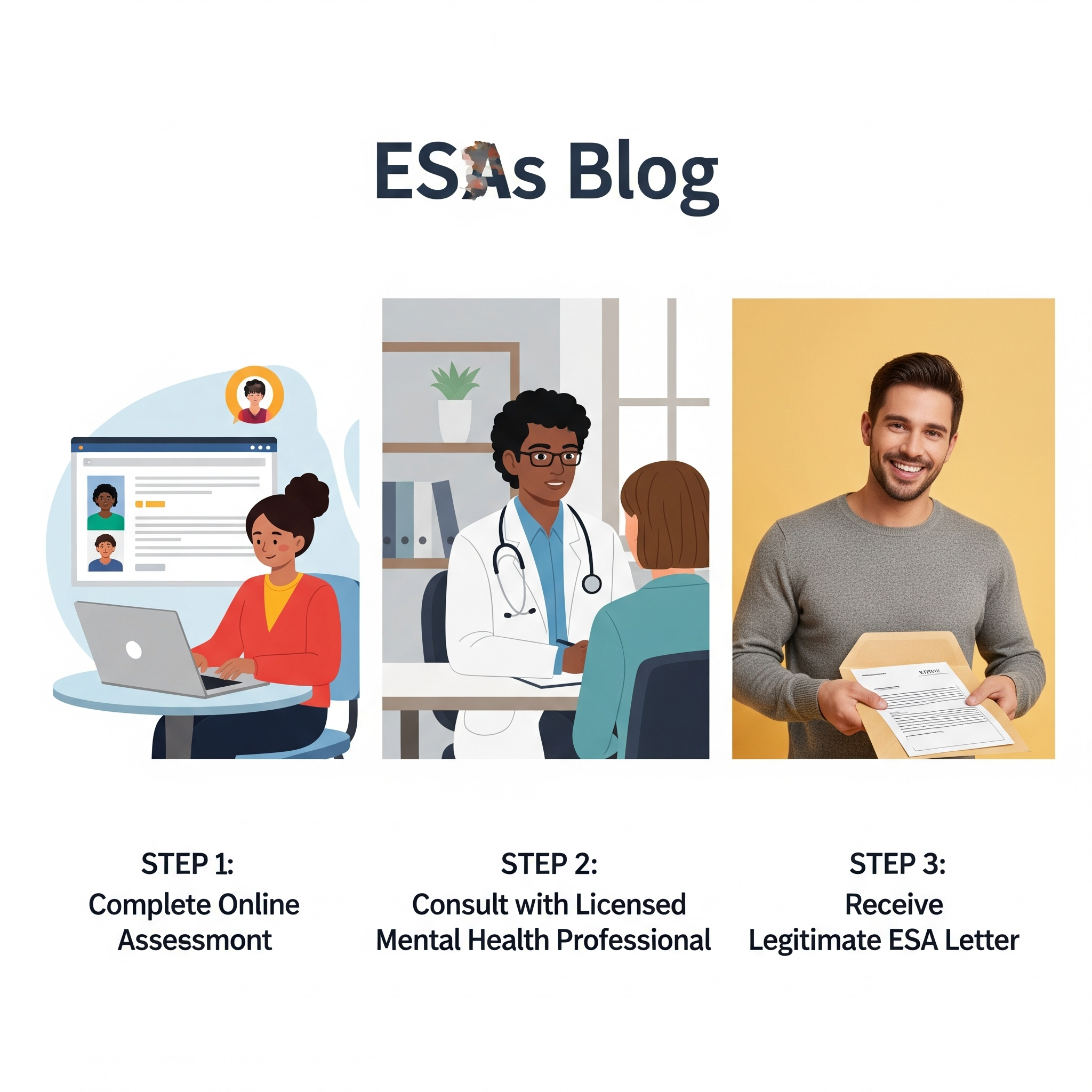Anxiety and depression are widespread mental health conditions that can significantly impact daily life, often leaving individuals feeling isolated, overwhelmed, and adrift. While traditional therapies and medications are vital, many people seek complementary approaches to enhance their well-being. This is where the profound bond between humans and animals comes into play, offering a unique and powerful source of support. Emotional Support Animals (ESAs) and Psychiatric Service Dogs (PSDs) have emerged as invaluable companions, providing comfort, stability, and even practical assistance to those navigating the complexities of anxiety and depression.
At CertifyESA, we understand the deeply personal journey of managing mental health. Our mission is to help individuals explore the potential benefits of ESAs and PSDs by providing legitimate, APA-formatted documentation from licensed mental health professionals. In this comprehensive guide, we’ll delve into the distinct ways these incredible animals contribute to mental wellness, backed by research and real-world experiences.
—
Understanding Anxiety and Depression: A Brief Overview
Before we explore the role of ESAs and PSDs, it’s important to grasp the nature of anxiety and depression:
-
Anxiety Disorders: Characterized by excessive worry, fear, or nervousness that interferes with daily activities. Symptoms can include restlessness, fatigue, difficulty concentrating, irritability, muscle tension, and sleep disturbances. Anxiety can manifest in various forms, such as generalized anxiety disorder (GAD), panic disorder, social anxiety disorder, and specific phobias.
-
Depression (Major Depressive Disorder): A mood disorder that causes a persistent feeling of sadness and loss of interest. It can affect how you feel, think, and behave, and can lead to a variety of emotional and physical problems. Symptoms often include persistent sadness, loss of pleasure in activities, changes in appetite or sleep, fatigue, feelings of worthlessness or guilt, difficulty thinking or concentrating, and thoughts of self-harm or suicide.
Both conditions can be debilitating, affecting relationships, work, and overall quality of life. Finding effective coping mechanisms and support systems is crucial for managing symptoms and fostering recovery.
—
The Calming Presence: How ESAs Help with Anxiety
Emotional Support Animals provide comfort and companionship, alleviating symptoms of emotional or psychological disabilities through their mere presence. They don’t require specific training to perform tasks; their therapeutic benefit comes from the unconditional love and emotional support they offer.
-
Reducing Stress and Promoting Relaxation: The simple act of petting an animal has been shown to lower cortisol (the stress hormone) levels and increase oxytocin (the bonding hormone), leading to a sense of calm and relaxation (Hoy-Gerlach et al., 2021). For individuals with anxiety, this can be a powerful tool for managing panic attacks and general anxious feelings.
-
Providing a Sense of Purpose and Routine: Caring for an ESA introduces a predictable routine into an individual’s life, which can be incredibly grounding for those struggling with the unpredictability of anxiety. Daily walks, feeding times, and grooming rituals offer structure and a sense of responsibility, pulling individuals out of cycles of rumination.
-
Alleviating Loneliness and Isolation: Anxiety can often lead to social withdrawal and feelings of isolation. ESAs offer constant companionship, reducing feelings of loneliness and providing a non-judgmental presence. This unconditional acceptance can be particularly helpful for those who find social interactions overwhelming.
-
Distraction from Anxious Thoughts: When consumed by anxious thoughts, an ESA can serve as a welcome distraction. Engaging with a pet, whether through play or cuddles, can shift focus away from distressing internal narratives, providing a much-needed mental break.
-
Encouraging Physical Activity: Many ESAs, especially dogs, require regular exercise. This encourages their owners to engage in physical activity, which is a known mood booster and anxiety reducer. Even short walks can make a significant difference in overall well-being.
—
Lifting the Fog: How ESAs Help with Depression
For those grappling with depression, the challenges can feel insurmountable. ESAs offer a gentle, yet powerful, means of fostering connection, motivation, and a renewed sense of joy.
-
Combatting Feelings of Sadness and Apathy: The consistent presence of an ESA can counteract feelings of profound sadness and apathy. Their playful antics, affectionate gestures, and need for interaction can bring moments of genuine joy and provide a reason to engage with the world.
-
Increasing Motivation and Self-Care: Depression often saps motivation, making even simple self-care tasks feel impossible. An ESA’s reliance on their owner can provide the necessary impetus to get out of bed, attend to basic needs, and engage in activities that were once enjoyed.
-
Building a Sense of Responsibility and Worth: Knowing that an animal depends on them can instill a powerful sense of responsibility and purpose in individuals with depression. This feeling of being needed and valued can contribute to a renewed sense of self-worth.
-
Facilitating Social Interaction: While ESAs are not service animals with public access rights, their presence can sometimes facilitate incidental social interactions. A friendly dog, for example, can be an icebreaker, leading to brief, positive exchanges with others.
-
Providing Unconditional Love and Acceptance: One of the most profound benefits of an ESA for depression is the unwavering, non-judgmental love they offer. In times of self-doubt or low self-esteem, this unconditional acceptance can be incredibly validating and healing.
—
Beyond Comfort: The Role of Psychiatric Service Dogs (PSDs)
While ESAs provide comfort, Psychiatric Service Dogs (PSDs) are specifically trained to perform tasks that directly mitigate a person’s psychiatric disability, such as anxiety or depression. These tasks are tailored to the individual’s needs and can offer a greater level of independence and safety.
-
Interrupting Destructive Behaviors: A PSD can be trained to interrupt maladaptive behaviors associated with anxiety or depression, such as repetitive self-harming actions, dissociative episodes, or obsessive behaviors. They might nudge their handler, bring them a comfort item, or physically block the behavior.
-
Grounding During Panic Attacks or Dissociation: During a panic attack or dissociative episode, an individual may feel detached from reality. A PSD can be trained to provide deep pressure therapy by lying on their handler’s chest, offer tactile stimulation through licking, or guide them to a safe space, helping them to ground themselves.
-
Reminding to Take Medication: For individuals who struggle with medication adherence due to depression or executive dysfunction from anxiety, a PSD can be trained to remind them to take their medication at specific times.
-
Performing Room Checks or “Blocking”: For those with anxiety that manifests as hyper-vigilance or paranoia, a PSD can be trained to perform room checks, enter a room before their handler, or stand between their handler and others in public to create a sense of personal space and safety.
-
Guiding in Overwhelming Situations: In crowded or overstimulating environments, a PSD can guide their handler to an exit, a quiet area, or provide a physical barrier to help them navigate the situation with less anxiety.
-
Alerting to Escalating Symptoms: Some PSDs can be trained to recognize the early signs of an anxiety attack or depressive episode and alert their handler, allowing for proactive coping strategies to be employed.
-
Retrieving Items: A PSD can retrieve items like a phone, water bottle, or emergency medication, which can be crucial during an episode where mobility or focus is impaired.
—
The Science Behind the Bond: Research Supporting Animal-Assisted Interventions
The growing body of research increasingly supports the therapeutic benefits of the human-animal bond for mental health.
-
A study published in the Human-Animal Interaction Bulletin found that individuals with serious mental illness who acquired an ESA experienced significant reductions in self-reported depression, anxiety, and loneliness over a 12-month period (Hoy-Gerlach et al., 2021). The study also observed a consistent pattern of higher oxytocin and lower cortisol levels after interactions with their ESAs, suggesting a biological impact on stress and bonding.
-
Research on psychiatric service dogs, particularly for veterans with PTSD, has shown promising results in reducing symptoms of PTSD, depression, and anxiety, and improving psychosocial functioning (VFW, 2024). These studies highlight how trained tasks, combined with companionship, contribute to better mental health outcomes.
-
A systematic review of literature on emotional support animals for adults with anxiety and depression concluded that the utilization of an emotional support animal improves symptoms and supports patients through adjunct or combined therapies (DigitalCommons@UMaine, 2023).
These findings, while often from smaller studies, provide compelling evidence that the unique bond with an ESA or PSD can play a significant role in managing the symptoms of anxiety and depression.
—
Is an ESA or PSD Right for You? Navigating the Path with CertifyESA
Deciding whether an Emotional Support Animal or a Psychiatric Service Dog is right for you is a personal decision that should be made in consultation with a qualified mental health professional.
-
Emotional Support Animals are generally suitable for individuals whose mental health condition benefits from the consistent presence and unconditional support of an animal. They do not require specialized training.
-
Psychiatric Service Dogs are for individuals with a disability who require a dog trained to perform specific tasks directly related to mitigating their psychiatric condition. This often involves more severe or debilitating symptoms that require practical intervention.
At CertifyESA, we specialize in connecting individuals with licensed mental health professionals who can assess your needs and provide the necessary documentation for an ESA or PSD letter, if appropriate. Our process is designed to be:
-
Legitimate and Ethical: We adhere to all federal guidelines, including the Fair Housing Act and the Air Carrier Access Act (for ESAs, prior to recent changes in airline policies for PSDs only), ensuring your letter is professionally and ethically obtained.
-
Convenient and Confidential: Our online platform allows for a discreet and efficient process, respecting your privacy every step of the way.
-
APA Formatted: All documentation provided by CertifyESA is in APA format, ensuring professional and widely accepted standards.
—
The CertifyESA Difference: Your Partner in Mental Wellness
Choosing CertifyESA means choosing a partner committed to your well-being. We believe in the power of the human-animal bond to transform lives and are dedicated to helping you access the support you need.
Our experienced team understands the nuances of mental health conditions and the specific requirements for ESA and PSD documentation. We prioritize:
-
Expert Assessment: Connecting you with qualified, licensed mental health professionals who conduct thorough evaluations.
-
Clear Guidance: Providing transparent information about the process, legal considerations, and the distinctions between ESAs and PSDs.
-
Compassionate Support: Offering a supportive and understanding environment as you explore this important aspect of your mental health journey.
—
Conclusion: Embracing the Healing Power of Companion Animals
Anxiety and depression can feel like an unending battle, but you don’t have to face it alone. Emotional Support Animals and Psychiatric Service Dogs offer a unique and profound pathway to enhanced mental wellness, providing comfort, stability, and practical assistance. From reducing stress and alleviating loneliness to performing life-changing tasks, these incredible animals truly embody the healing power of the human-animal bond.
If you believe an ESA or PSD could be a vital component of your mental health management plan, CertifyESA is here to guide you. Take the first step towards finding your calm and embracing a more supportive, fulfilling life.
—
References
DigitalCommons@UMaine. (2023). Effects of Emotional Support Animals on Adults with Depression and/or Anxiety. University of Maine. https://digitalcommons.library.umaine.edu/student_work/26/
Hoy-Gerlach, J., Fritz, C. L., & Miguel, C. M. (2021). Emotional Support Animals: First Empirical Evidence of Mental Health Benefits in Individuals with Serious Mental Illness. Human-Animal Interaction Bulletin, 10(1), 1-14. https://news.utoledo.edu/index.php/05_20_2021/study-finds-first-scientific-evidence-emotional-support-animals-benefit-those-with-chronic-mental-illness
VFW. (2024, October 17). Service Dogs May Reduce PTSD Symptoms. Veterans of Foreign Wars of the United States. https://www.vfw.org/media-and-events/latest-releases/archives/2024/10/service-dogs-may-reduce-ptsd-symptoms





